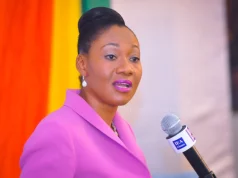The 2022 Girls’ Iron-Folate Tablet Supplementation (GIFTS) Survey conducted by the Ghana Health Services (GHS) with support from the United States Center for Disease Control (CDC) and UNICEF has covered over 2.5 million adolescent girls who received Iron and Folic Acid (IFA) Supplementation to boost their nutritional demands.
The exercise covered about two hundred and forty (240) Junior High and Senior High Schools across the 16 regions of the country providing weekly combined Iron Folic Acid tablets to in-school and out-of-school adolescent girls.
Addressing stakeholders in Tamale last Thursday (August 22, 2024) at a forum to disseminate the survey results, the Deputy Director-General of Ghana Health Service, Dr Anthony Adofo Ofosu noted that the GIFTS programme since 2017 has focused on health and nutrition education, advocacy for clean water and sanitation, hygiene promotion and malaria prevention in schools.
He observed an increase in average hemoglobin concentration and a 26% adjusted reduction in anaemia prevalence among adolescent girls who consumed IFA over eight months period in the surveyed schools.
According to Dr Ofosu, the National survey results show reduction in prevalence of anaemia among adolescent girls from 48% in 2014 to 44% in 2022.
The Deputy Director General however mentioned inconsistent supply chain leading to shortages of iron and folate supplements, misconceptions and cultural beliefs as some of the challenges which hindered acceptance and adherence to the exercise.
He further stated that insufficient funding hampers the scale-up to all schools and sustainability of the programme.
Dr Anthony Adofo Ofosu argued that the importance of data-driven decision-making and research in informing policies and programs cannot be over emphasized, thereby lauding UNICEF and USA, CDC for the support in conducting this assessment.
On behalf UNICEF, the Deputy Representative, Fiachra McAsey, said the GIFTS program exemplifies the impact of partnership and collaboration in addressing the critical health and nutrition needs of adolescents, particularly adolescent girls.
As a result, he indicated that UNICEF is proud to have contributed to the program’s expansion, reaching over 2.5 million adolescent girls with Iron-Folic Acid tablets across all 16 regions.
He emphasized, “Our efforts have been focused on capacity building, guideline development, supportive supervision, and monitoring, and scaling up the program.”
Mr. McAsey reaffirmed the commitment of UNICEF to continue supporting the Government of Ghana in achieving the Sustainable Development Goals, specifically Goal 2 which aims to achieve Zero Hunger, and Goal 3 which highlights on Good Health and Well-being for all.








































